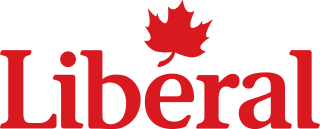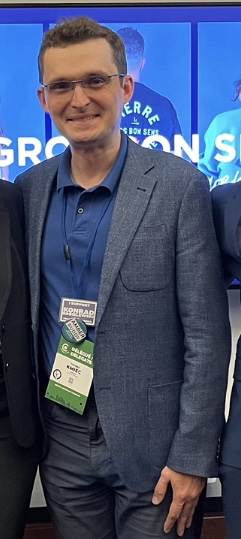Related Research Articles

The Liberal Party of Canada is a federal political party in Canada. The party espouses the principles of liberalism, and generally sits at the centre to centre-left of the Canadian political spectrum, with their main rival, the Conservative Party, positioned to their right and the New Democratic Party positioned to their left. The party is described as "big tent", practising "brokerage politics", attracting support from a broad spectrum of voters. The Liberal Party is the longest-serving and oldest active federal political party in the country, and has dominated federal politics of Canada for much of its history, holding power for almost 70 years of the 20th century. As a result, it has sometimes been referred to as Canada's "natural governing party".
The Conservative Party of Canada, colloquially known as the Tories, is a federal political party in Canada. It was formed in 2003 by the merger of the two main right-leaning parties, the Progressive Conservative Party and the Canadian Alliance, the latter being the successor of the Western Canadian–based Reform Party. The party sits at the centre-right to the right of the Canadian political spectrum, with their federal rival, the centre-left Liberal Party of Canada, positioned to their left. The Conservatives are defined as a "big tent" party, practising "brokerage politics" and welcoming a broad variety of members, including "Red Tories" and "Blue Tories".

Justin Pierre James Trudeau is a Canadian politician who has been serving as the 23rd prime minister of Canada since 2015 and the leader of the Liberal Party since 2013. Trudeau was the second-youngest prime minister in Canadian history when he took office and the first to be the child of a previous holder of the post, as the eldest son of Pierre Trudeau.
The Minister of Democratic Institutions was a Minister of the Crown in the Canadian Cabinet, associated with the Privy Council Office. The position was first created in 2003 as "Minister responsible for Democratic Reform". It was also titled "Minister responsible for Democratic Renewal" and "Minister of State " during various governments. The position was abolished on November 20, 2019.
Canada holds elections for legislatures or governments in several jurisdictions: for the federal (national) government, provincial and territorial governments, and municipal governments. Elections are also held for self-governing First Nations and for many other public and private organizations including corporations and trade unions. Municipal elections can also be held for both upper-tier and lower-tier governments.

Andrew James Scheer is a Canadian politician who has served as the member of Parliament (MP) for Regina—Qu'Appelle since 2004. Scheer served as the 35th speaker of the House of Commons from 2011 to 2015, and was the leader of the Conservative Party and leader of the Official Opposition from 2017 to 2020.

Joyce C. Murray is a Canadian politician who has represented the riding of Vancouver Quadra in the House of Commons as a member of the Liberal Party since 2008. She was re-elected in the 41st, 42nd, 43rd, and 44th federal elections. Murray was appointed as President of the Treasury Board and Minister of Digital Government on March 18, 2019. She was re-appointed as Minister of Digital Government following the 2019 election. In 2021, she was appointed Minister of Fisheries, Oceans and the Canadian Coast Guard, a position she held until July 2023.
The New Democratic Party is a federal political party in Canada. Widely described as social democratic, the party occupies the centre-left of the political spectrum, with the party generally sitting to the left of the Liberal Party. The party was founded in 1961 by the Co-operative Commonwealth Federation (CCF) and the Canadian Labour Congress (CLC).
This article covers the history of the Conservative Party of Canada.
Electoral reform is a change in electoral systems which alters how public desires are expressed in election results.
Dogwood BC is a Canadian non-profit public interest group based in Victoria, British Columbia. The organization works to increase the power of British Columbians over government decision-making. They were instrumental in the fight against Enbridge's Northern Gateway pipeline, introducing a tanker moratorium on B.C.'s north coast and the province's campaign finance reform. The organization currently works to stop Kinder Morgan's Trans Mountain tanker and pipeline expansion in B.C., ban U.S. thermal coal exports through B.C. ports and restore accountability and transparency to the province's democracy by calling for a Corruption Inquiry.

The 2015 Canadian federal election held on October 19, 2015, saw the Liberal Party, led by Justin Trudeau, win 184 seats, allowing it to form a majority government with Trudeau becoming the next prime minister.

Tomasz Kmiec is a Polish-Canadian politician who serves as the Member of Parliament for Calgary Shepard in the House of Commons of Canada under the Conservative Party of Canada, first elected in 2015. He currently serves as Shadow Minister for Immigration, Citizenship and Refugees.

Maryam Monsef is a former Afghan Canadian politician. She served as the member of Parliament for the riding of Peterborough—Kawartha from 2015 to 2021 as a member of the Liberal Party of Canada.

The 2019 Canadian federal election was held on October 21, 2019. Members of the House of Commons were elected to the 43rd Canadian Parliament. In keeping with the maximum four-year term under a 2007 amendment to the Canada Elections Act, the writs of election for the 2019 election were issued by Governor General Julie Payette on September 11, 2019.

The premiership of Justin Trudeau began on November 4, 2015, when the first Cabinet headed by Justin Trudeau was sworn in by Governor General David Johnston. Trudeau was invited to form the 29th Canadian Ministry and become Prime Minister of Canada following the 2015 election, where Trudeau's Liberal Party won a majority of seats in the House of Commons of Canada, defeating the Conservative Prime Minister Stephen Harper's government. In both federal elections of 2019 and 2021, Trudeau was re-elected with minority governments; with his party losing the popular vote twice.
The House of Commons Special Committee on Electoral Reform (ERRE) (French: Comité spécial sur la réforme électorale) was a special committee of the House of Commons of Canada established in 2016 during the 42nd Canadian Parliament to investigate reforms to the Canadian electoral system. The formation of "an all-party Parliamentary committee to review... [electoral] reforms" was an election promise by Liberal Party leader Justin Trudeau in the 2015 federal election. After the Liberals won a majority in the election, and Trudeau became Prime Minister of Canada, he indicated the formation of a special committee was a priority in his mandate letter for Minister of Democratic Institutions Maryam Monsef. Shortly after the committee submitted its report to Parliament on December 1, 2016, Monsef was transferred to the position of the Minister of Status of Women and Karina Gould took over the electoral reform file. Shortly after taking her position, Gould announced that the government would no longer be pursuing reform of the electoral system, stating "It has become evident that the broad support needed among Canadians for a change of this magnitude does not exist."

A referendum on electoral reform took place by mail-in ballot between October 22 and December 7, 2018, in the Canadian province of British Columbia. 61.3 percent of voters supported maintaining the first-past-the-post voting system rather than switching to a proportional representation voting system, which was supported by 38.7 percent of voters. This was British Columbia's third referendum on electoral reform, following ones in 2005 and 2009.

Karina Gould is a Canadian politician who has been the Leader of the Government in the House of Commons since July 26, 2023. A member of the Liberal Party, she has served as member of Parliament (MP) for the riding of Burlington in the House of Commons since October 19, 2015. Gould was first appointed to Cabinet on February 1, 2017 as the minister of democratic institutions, serving in the role until she was appointed as the minister of international development on November 20, 2019, and has since then served in two other portfolios. Gould is the youngest woman to serve as a Cabinet minister in Canadian history. Gould went on maternity leave in January 2024 and was temporarily replaced as House Leader by Steven MacKinnon, but is expected to return to the position at the end of July 2024.
Several policies regarding interior and domestic issues in Canada were planned and adopted by the Canadian Cabinet, chaired by Prime Minister Justin Trudeau, following the October 19, 2015 election of the Liberal Party to a majority of seats in the House of Commons, such as social and environmental policies.
References
- ↑ "About LeadNow". LeadNow. 2017. Retrieved July 18, 2018.
- ↑ "Our Vision". Leadnow.ca (new site demo). Retrieved January 17, 2020.
- ↑ "Leadnow: people powered change". Leadnow.ca. Retrieved January 17, 2020.
- ↑ The Canadian Press (June 4, 2018). "Rallies planned across Canada to protest Kinder Morgan buyout". News 1130 . Retrieved July 18, 2018.
- ↑ Ljunggren, David; Gordon, Julie (April 11, 2018). "Justin Trudeau to pressure B.C. government to accept Trans Mountain pipeline". Global News . Retrieved July 18, 2018.
- ↑ "The 'big experiment' of voting strategically this election" . Retrieved January 20, 2020.
- ↑ Austen, Ian (October 15, 2015). "Canadian Campaign Blurs Party Lines to Thwart Conservatives". The New York Times. ISSN 0362-4331 . Retrieved January 17, 2020.
- ↑ Amara Possian, Leadnow's elections... - CTV News Channel , retrieved January 17, 2020
- ↑ Northam, Katelynn (2016). "Submission to the Special Committee on Electoral Reform" (PDF). OurCommons.
- ↑ Wherry, Aaron (February 1, 2017). "Opposition accuses Trudeau of 'betrayal' as Liberals abandon promise of electoral reform". CBC.
- ↑ "Trudeau breaks voting system pledge". BBC News. February 1, 2017. Retrieved January 25, 2020.